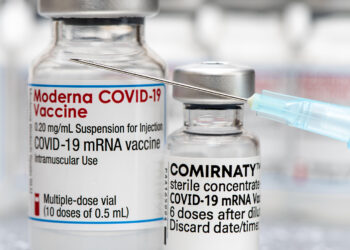
- The Nimbus variant of COVID-19 is on the rise, as many have reported a painful symptom they’re calling “razor blade throat.”
- If you have a severe sore throat, it’s important to get tested to rule out strep throat to avoid severe complications.
- COVID-19 precautions like masking and vaccination remain important.
A newly identified COVID-19 variant called “Nimbus” is rapidly spreading in the United States and making headlines with a common symptom that’s turning heads in exam rooms.
People contracting a COVID-19 infection are reporting an unusually intense sore throat, described as feeling like swallowing razor blades.
Some think this symptom, dubbed “razor blade throat,” may set this variant apart from earlier ones.
However, experts aren’t so sure. Sore throat has long been recognized as a COVID-19 symptom.
Early data suggest Nimbus may not cause more severe illness overall, but reports of severe sore throats are raising questions about how this variant might differ from its predecessors.
Here’s what experts told Healthline about the Nimbus variant — and what you should know.
According to the World Health Organization (WHO), Nimbus, also known as NB.1.8.1, is a subvariant of the Omicron variant of the SARS-CoV-2 virus that causes COVID-19.
Yale School of Medicine Assistant Professor Scott Roberts, MD, explained that Nimbus currently accounts for about one-third of COVID-19 cases in the United States.
“It is more transmissible than the current circulating variants because of several mutations in the spike protein that make it distinct from the others,” he told Healthline.
“But, it is still an omicron subvariant related to some variants that were circulating previously, so I suspect there will be an increase in cases, but not a wave to the degree we have had previously.”
Kartik Cherabuddi, MD, FIDSA, Chief Hospital Epidemiology Officer at Tampa General Hospital, noted that while Nimbus is currently surging around the world, the public health risk is still low compared to other Omicron lineages.
“Early and limited laboratory data do not show a significant capability to evade the immune system or increased resistance to antiviral treatment,” he told Healthline.
Cherabuddi added that no reported studies are currently available on the impact of Nimbus on clinical outcomes.
However, “[r]outine surveillance, so far, does not reveal an increase in hospitalization or death,” he said.
Roberts said the symptoms of the Nimbus variant are the same as those of prior COVID-19 variants, including fever, cough, and sore throat.
“The ‘razor blade throat’ is anecdotal and there is no evidence to suggest that this variant leads to more severe sore throat than other variants,” he added.
Roberts advised, however, if you do have a sore throat, it would be a good idea to test for COVID-19 to make sure it is not the cause.
If your sore throat is severe, he also recommends checking in with your doctor to rule out strep throat.
Other common symptoms of COVID-19 include loss of taste or smell and fatigue.
Less frequently, individuals may experience:
- sore throat
- headaches
- body aches
- diarrhea
- skin rash
- discoloration of fingers or toes
- red, irritated eyes
- sudden fever
- sore throat with white patches
- headache
- chills
- loss of appetite
- swollen lymph nodes
- problems with swallowing
Experts say it’s important to distinguish strep throat from COVID-19.
Unlike COVID-19, which is caused by a virus, strep throat is a bacterial infection caused by group A Streptococcus.
Strep throat often requires antibiotic treatment to prevent potentially serious complications.
These may include peritonsillar abscesses (pus-filled infections behind the tonsils), rheumatic fever (which can damage the heart, joints, and skin), post-streptococcal glomerulonephritis (a type of kidney inflammation), and, in rare cases, streptococcal toxic shock syndrome or meningitis.
The first thing to know about protecting yourself from the Nimbus variant is that nothing has really changed in this department.
“The same tools that worked before will still work: handwashing, avoiding people who are sick, good ventilation, getting vaccinated, and masking in high risk settings,” said Roberts.
The
Older adults, high risk individuals, and those who’ve never been vaccinated are especially encouraged to get it. Parents should consult a healthcare professional for kids under 18.
The CDC additionally notes that immunity from previous vaccines wanes over time, making updated vaccination important.
COVID-19 vaccine recommendations may also change soon, making it more difficult for healthy adults, children, and pregnant people to get one.
Cherabuddi added there are certain symptoms that would indicate you need to consult with a physician, such as:
- severe throat pain
- throat pain that lasts longer than a week
- weight loss
- food sticking in your throat
- new or worsened shortness of breath
“If any of these red flags occur, have it checked out,” he said.
Source link : https://www.healthline.com/health-news/new-covid-variant-nimbus-razor-blade-throat-symptom
Author :
Publish date : 2025-06-19 06:32:34
Copyright for syndicated content belongs to the linked Source.














